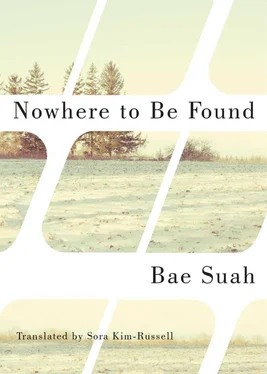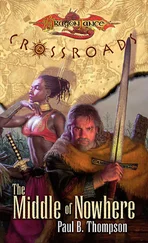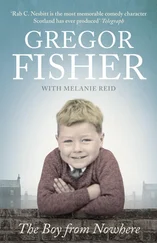After my brother left, after about a year had passed, we were no longer able to stay at number 16, where we’d been living. According to the district office, construction of the new apartment building had weakened the ground and put neighboring houses that had not been rebuilt in danger of collapsing. Our home was no more. Number 25. Number 337. Number 1115. All of the places where we lived. We lost touch with my brother — he never wrote, and he never sent money. I do not think of it as a betrayal. What my brother had promised when he squeezed my sweaty hand as if he’d never let go was not money or letters. It was the erasure of time that goes by the name of money and letters. I understood that. The sort of time in which people could become the purest they’d ever been; cancel any unimportant plans they had; and long for a random, distant ideal. Our blood, which refused to be moved by a warm prayer over breakfast, a conversation with a loving family, a life that evolves step by step — that was what made my brother free. My brother, who was somewhere in the dark sewer tunnels of Osaka. I loved that brother. Not because he was family or because he’d bought me a washing machine. What he had left to me was a long-long-lived frigidity. The stillness of a beautiful, taxidermied want.
“Don’t you dare think of leaving.”
My mother had a lot of worries about me.
“You’re still a long way from paying me back. Your debt won’t be over until I’m dead. Not ever.”
My mother worried for no reason. She would outlive all of us. That was the truth. My bright, clever little sister never became a beautician or a model or a lesbian. That was sad. Sadness made her hair fall out. When she’d lost nearly all of her hair, she spoke to me from inside the mirror.
“Sister, I’m turning into taxidermy.”
I go in search of number 16. When I insert the key, the lock creaks with rust before finally opening. The rain falls hard. The house is a mess; the roof is close to caving in. The walls that haven’t toppled over sit askew, as if the ground below them is slowly sinking. Nearly all of the walls drip with rainwater. Black spiders spin webs; the electric lights are broken. The windows are all shattered and no light comes in. It was once a four-room house with a kitchen and a bathroom, but now it stands in the shadow of twelve- pyeong apartments, its walls covered in blue mold. The smell: awful.
The man stands in the courtyard as if he does not dare step inside a house like this. No one would have ever actually lived in such a place. The first time he touches me, he says, “Tell me, who was the first man you slept with?”
“I can’t remember.”
“Don’t lie,” he says. “Tell me. It’s okay.”
“I told you I can’t remember.”
“How old did you say you were? Seventeen? Who was he? A local gang member? An older boy at your church? Your high school physics teacher? Or did you do it at a bar for money?”
In a flash his face twists with fear and desire and disillusion. I work hard to become his fear and desire and disillusion. It comes back simultaneously as my own fear and desire and disillusion. He enjoys seeing another version of himself through me, a version that he could never become.
“You’re cold. Cold as winter rain. A woman like you deserves to be punished,” he says. “Get down and crawl like a dog.”
Just then I walk by outside the darkened window.
Static electricity raises goose bumps on my skin.
It is my first time encountering myself. I walk on by without looking. There is no smell, no trembling. I’ve heard that what appears in a hallucination is an image of the dead.
“What’s wrong with you?” he asks.
“I just walked past the window.”
“What?”
“I walked by. I see myself for the first time.”
He lets out a small laugh and ignores me.
“This place is going to fall down at any second.”
“It was diagnosed as falling a long time ago.”
“It’s a dump.”
“This is where I was born and grew up.”
“I never would’ve figured you for lower class.”
“Where were you in 1988? Were you in Yeoncheon, by any chance?”
“Don’t be stupid. I was in the United States.”
“When you were in the United States, did you ever dream about snow falling on a military base near a fishing hole? About malnourished soldiers and a dead chicken?”
“Why would I see that in a dream?”
He picks up off a chair a photo that is soiled with dust and the carcasses of spiders and the footprints of mice. He flicks his lighter and takes a long look at it. It’s the portrait of my brother and me taken at the photo studio when 1988 was ending. The last photo of us, where we held each other’s sweaty hand and he clung desperately to mine as if crazed and swore that he would take care of me and that things would be easier from then on. The last photo from a hundred years later.
“Is this you?” he asks, pointing to me in the photo.
“Yes.”
“Who’s he?”
“My brother.”
“He looks a lot older than you.”
“Ten years.”
“Where is he now?”
“Probably in the sewers of Osaka. He’s been living there for a long time now.”
“Strange family.”
He moves the lighter away from the photo and over to my body. He holds it close to my face. The light dazzles my eyes and I blink. He’s an especially visual creature. When the lighter hovers by my crotch, he asks, “Can I burn you a little?”
I nod and shut my eyes. Burn me. Pour gasoline over me and set my body on fire. Burn me at the stake like a witch. Wrap me in garbage bags and toss me in the incinerator. I’ll turn into dioxin and make my way into your lungs. Stroke my face lightly with a razor blade and suck the blood that comes seeping out. Lap it up like a cat. I want to be covered in blood. I’ll cry out in the end and weep for fear of leaving this world without ever once discovering the me inside me, the ugly something inside me. The foul scent of burning hair. The heat.
“I’ll make you grind against my toes, and then I’ll come on your face,” he says.
And then he does.
He and I walk out into the waterfall of rain. Number 16 is empty again and left to the country of mold and spiders. On rainy nights like this, people linger in their houses, afraid to so much as breathe too loudly. He and I are hungry.
“Let’s go get something to eat,” he says.
“I hate chicken. Anything is fine as long as it’s not chicken.”
The rain flows along the streets, down, down to the low spots. In silence we pass the lonely deserted main drag, the neighborhood under redevelopment where the subway construction is not yet finished, the old apartment complex, the street with the run-down bars. From the vending machine at a closed gas station, we each get instant coffee and share a joint. The filter keeps us from getting too high, so we have no problem driving.
“I’m not that into this,” I say.
“Then where should we go?” he asks.
“The Rose Garden.”
“That’s in Thailand.”
“It’s on the way to Yeoncheon.”
“Yeoncheon is too far. You want to drive all the way to the border?”
“It’s not as far as the border. We’ll be there in no time.”
“Long way to go for a bite to eat.”
“There’s nowhere else to eat at this hour.”
Clouds drift through my head. Blue sky so deep you’d never know the end of it, clouds from Africa, a slow-moving breeze, thunder and lightning. Pacing in front of a gas station on a night as black as lacquer. An hour when even the radio is silenced by rain. I finally spot The Rose Garden. It is older and more run-down and out of place in this world. Bricks line the gray dirt courtyard devoid of even a single rosebush.
Читать дальше












